What seeds can chickens eat? 17 seeds tested and costed.
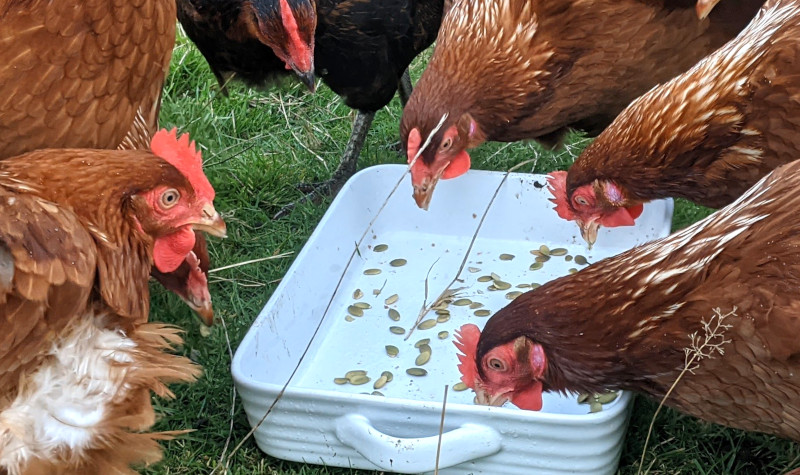
Table of Contents
- Can chickens eat any seeds?
- Do chickens like seeds?
- Can chickens choke to death on seeds?
- What seeds are good for chickens?
- Herb and spice seeds for chickens:
- Fruit seeds for chickens:
- Table of seeds and their value to cost ratio.
- Can I give my chickens wild bird seed?
- What seeds are toxic to chickens?
- Best seeds for chickens:
- How to feed seeds to chickens:
- From what age can chickens eat seeds?
Some seeds are excellent feeds for chickens and add not only variety to the diet but essential vitamins, minerals and oils.
Many seeds contain coloured compounds which help with the yolk colour and some are rich in omega fats which also find their way into the yolks to enrich your diet as well.
There are many advantages to seed in the poultry diet, they are packed full of nutrients and store well if kept dry.
As with all treats, remember not to overfeed seeds to chickens. Seeds can be given at up to 10% of the diet of a chicken.
Can chickens eat any seeds?
Chickens can eat many seeds but not all, some will be poisonous and must be avoided and some need to be cooked or sprouted to be edible.
A good rule of thumb is that If you can eat it , then your chicken can and if you prepare them like you would if you were going to eat them then it will be good for chickens.
A good example of this would be cooking lentils, raw they can make you ill but cooked they are good to eat.
Do chickens like seeds?
Chickens love seeds. I add a selection of seeds to my scratch mixture and the hens go nuts for it.
Below: A video of my bantam Barnevelder flock getting safflower seeds as a treat.
You can not feed chickens only seeds and expect them to thrive, they need a balanced mixed diet.
Can chickens choke to death on seeds?
I have never seen a chicken choke on seeds, or any other food and I have been keeping many types of poultry for more than 25 years.
Below: An action shot of a hen eating a large chickpea whole.
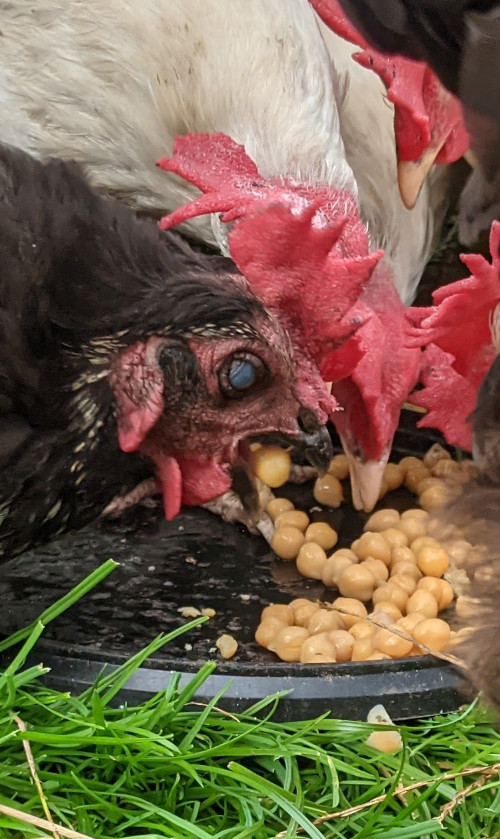
I have also seen a chicken swallow a mouse whole without choking so it is not something a backyard keeper has to worry about
What seeds are good for chickens?
Here is a short list of easily available seeds that are good for chickens to eat:
- Sunflower seeds,
- Safflower seeds,
- Buckwheat seed,
- Hemp seed,
- Flax seed,
- Pumpkin seed,
- Canola, rapeseed or any brassica seeds.
Here is the full list of seeds tested on my hens:
Nutritional content is an average and will vary depending on the plant variety, climate and where the seeds comes from as well as hoe long they have been in storage.
Buckwheat seeds are 13% protein, 3% fat and packed with manganese, magnesium, phosphorus, zinc and B vitamins.
Below: Buckwheat is a dark pyramid shaped seed.
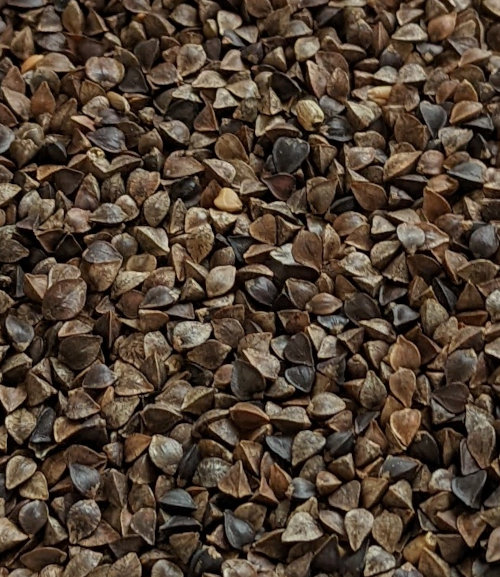
Despite the name they are not even closely related to wheat and are gluten free. The amount of shell to seed is very small and the coating is easily digested making buckwheat a good food for chickens.
Budgie seed is a blend of seeds and may be okay for chickens depending on what has been mixed into it.
Canary seed is 20% protein and 5% fat and 55% starches with a good mix of minerals and vitamins. Canary seeds are an excellent feed for chickens even if they are a little small.
Canola or rapeseed are small, round, black, oil rich seeds from a member of the Cruciferous (brassica) family of plants that includes broccoli and cauliflower. The straight seeds have between 40 and 50% oil in their natural form and often find their way into animal feeds after the oil has been extracted.
Below: Canola are small black oil rich seeds that are good for sprouting as well as feeding plain.
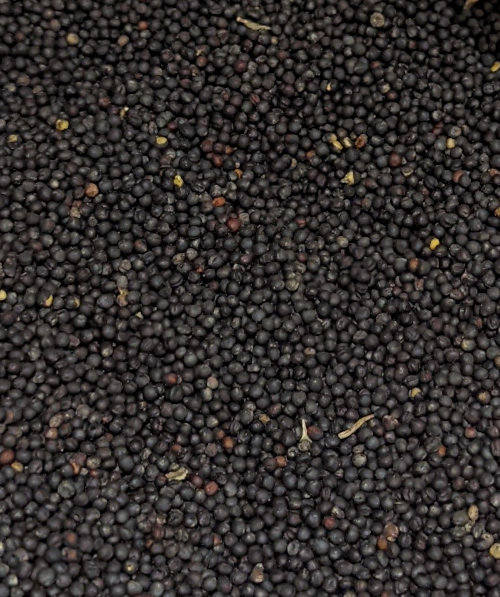
After the oil has been removed, a protein rich cake is left over which makes excellent animal feed. I prefer to sprout canola because of it's small size but the chicken do find and eat the tiny seed with no problems at all.
Chia seeds come from a desert dwelling plant which is a member of the mint family. It is an excellent source of omega-3 fatty acids and contains proteins and minerals including iron, calcium, magnesium and zinc.
Chia seed is both expensive and very high in fibre which is not good for hens or your wallet and there are better choices.
You can happily give your chickens any left over Chia seeds you are not eating yourself. Chia seeds contain 17 % protein which is good for chickens.
Coriander or cilantro seed are a little low in protein to be an excellent chicken feed but they are packed with vitamins and minerals. If like me you grow your own herbs they can left to flower and set seed so the chickens can have them. Cilantro or coriander seeds are 14% protein and 17% fat and the plants produce them in huge numbers in late fall.
Flax seed and linseed are an oil seed rich in omega 3 fatty acids. Flax contains 18% protein, 42% oil and is rich in Calcium, Iron and magnesium. Flax seeds also contain 45 mcg of lutein and zeaxanthin which are known to be good for the eyesight and give richer colour to the egg yolk. There is a disadvantage to flax seeds, when they get wet they become very slimy and sticky because of their fibre content.
Flax seed is good for chickens and flax meal or milled flax is often used in poultry feed as an omega 3 supplement.
Grass seed forms a significant part of the diet of free range chickens, My chickens regularly eat both grass and clover seed while they are ranging around the land. Grass and grass seed is something chickens have evolved to eat over time and are packed with minerals and nutrients.
Many of the seeds we feed to poultry come from grasses, both flax and canary seed are grass seeds as are all the grains we consume in society today.
Hemp seeds contain high levels of omega-3 and omega-6 essential fatty acids in the ratio 3 to 1. Hemp also contains Iron, vitamin E, manganese, magnesium, Zinc and B vitamins.
You don't need to worry, your chickens won't be getting high from eating a few hemp seeds as the seeds you buy are from a variety that produces very low levels of cannabinoids.
Below: My egg flock showing how much they like hemp seed. I add hemp seeds to the chickens scratch grains in the fall as the chickens moult.
The real value of Hemp seed is that they have 32 grams of protein and 49 grams of oils per 100 grams with only 1.2 grams of sugars. Hemp seed is an excellent if expensive chicken feed.
Niger seeds are an oil seed similar to flax or linseed. You can feed Niger seed to chickens and they are rich in protein, oils, vitamin A and some minerals. Niger seeds contain phytic acid which is an anti nutrient which can reduce the availability of other nutrients to the body.
My chickens didn't even look at Niger seed but yours may be different.
Shelled or husked sunflower seeds are a good feed for chickens as they contain 21% protein and 50% oil and are rich in vitamins and minerals.
Shelled sunflower seeds are an excellent feed additive for the moult when chickens lose and regrow their feathers.
Black oil or striped sunflower seeds have the same seed in the middle but the shell makes up 40% of the mass of the seed and is pure fibre with no nutritional value at all to chickens.
Below: Here are my chickens largely ignoring black oil sunflower seed.
Safflower seeds are 16% protein and 38% fats and oils. They also contain a yellow colour which can help give your eggs a better yolk.
Below: Safflower seeds are nutrient rich, cheap, available and have a thin coat making them easily digestible.
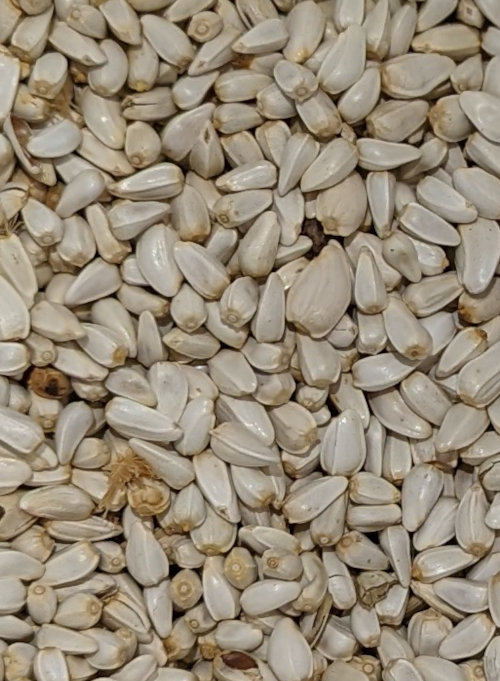
Safflower seeds also contain a good mix of vitamins and minerals but the real benefit is that the protein in safflower seed is 1.8% methionine, which is an extremely important amino acid in poultry diets.
Sesame seed are high fat (50%) and moderate protein (18%) and are very low in sugars making sesame a good feed for chickens. Sesame seeds are high in minerals especially Selenium and also contain some B vitamins as well as vitamin E.
Below: Some bantams eating sesame seeds. Chickens can eat even the smallest seeds without any trouble at all.
The protein in sesame has good availability and is easily absorbed in the body. 3.3% of the protein in Sesame is the amino acid methionine making it an excellent feed for chickens
Poppy seed should not be given to chickens in large quantities. Human beings can fail drugs tests from eating even small amounts of poppy seeds and chickens are much smaller and their tiny livers are unable to process residual opium in poppy seeds.
It is true that cooking does reduce the levels of opiates in poppy seeds and I could not find any evidence of testing in poultry to determine toxicity levels. If you reduce the allowances for humans to the weight of chickens you get a maximum dose of 6 grams of poppy seeds.
When it comes to poppy seeds, if there are a few on bread or baked into a sponge then that will likely be fine but avoid giving too much on their own.
Watermelon, cantaloupe and melon seeds are not available to buy in any quantity but after you have finished with your melon you can and should feed the seeds to your chickens.
Pumpkin and squash seeds are good for chickens and can be fed whole to chickens with no worry at all.
All melon and pumpkin seeds have thin hulls and are easily digestible with a good range of nutrients.
Other vegetable seeds that chickens can eat include pepper, chilli, cucumber, lettuce, radish and broccoli.
Herb and spice seeds for chickens:
The jury is out on whether spices and herb can affect the flavour of the eggs or meat that chickens produce.
Edible herb and spice seeds include nigella, cumin, fenugreek, fennel, caraway, coriander and mint.
Herb fed poultry is a thing and you can buy it in quite a few places.
Fruit seeds for chickens:
The list of fruit seeds that are good for chickens is quite short:
- Papaya,
- Melon and watermelon,
- Any berry like raspberry or blueberry seeds,
- Passion fruit,
- Pomegranate.
Avoid the seeds of any plum, cherry apple, pear and quince as too many of those seeds can make chickens ill.
Table of seeds and their value to cost ratio.
Seeds are only of value in the poultry diet if they are affordable. Below is what I paid for 25 Kg equivalent and their feed value.
| Seed type. | Cost. | Food value. |
| Buckwheat. | £22 ($30) | High |
| Canary seed. | £26 ($35) | High |
| Canola (Rapeseed). | £16 ($22) | Average. |
| Chia seeds. | £100 ($135) | Average. |
| Coriander. | £87 ($115) | Good. |
| Flax seed. | £28 ($38) | Good. |
| Hemp seed. | £40 ($55) | Very High. |
| Shelled Sunflower. | £26 ($35) | Good. |
| Black oil sunflower. | £21 ($28) | Poor. |
| Safflower seed. | £22 ($29) | High. |
| Sesame seed. | £80 ($105) | Good. |
| Pumpkin seed. | £89 ($118) | Average. |
You may need to find a decent animal feeds merchant to get you some seeds to add to your scratch at a reasonable price.
Can I give my chickens wild bird seed?
Wild bird seed is often a mix of nuts and seeds and may contain something your chickens should not be eating. Wild bird seed can be processed in factories that are not certified and inspected as animal food producers.
This could mean contaminated or sub standard mixtures.
Seed for wild birds may not have been tested for heavy metal or fungal contamination and could end up making your chickens and eventually yourself sick.
What seeds are toxic to chickens?
There is a long list of poisonous seeds, here are some of the most common:
- Potato. The small round seed produced after it flowers.
- Any member of the ricin family.
- Poppy seeds in large quantities.
- Foxglove.
- Jack in the pulpit.
- Lily of the valley.
- Morning glory.
- Sweet peas.
- Any raw or unprocessed beans or legume.
If in doubt avoid giving to chickens.
Best seeds for chickens:
In reality there are several different answers.
The best seeds for your chickens are ones you can get easily for a reasonable price. There is little point in bankrupting yourself buying imported chia seeds if you can get canola seed for a few dollars a hundredweight.
My preference is for sunflower, safflower and hemp as these have the best feed value to their cost.
The third answer is that any seeds you can produce yourself. I have a vegetable garden and always let the broccoli, radishes, coriander and lettuce plants go to seed then feed them to the chickens.
How to feed seeds to chickens:
The best way to feed seeds to chicken is to add a little to their scratch feed.
The adage little and often applies to feeding seed to chickens, a few in the feed is much more beneficial than feeding large amounts at a time.
When it is very cold a handful of shelled sunflower seeds is full of easy to digest protein and calories and can help the flock weather the cold.
From what age can chickens eat seeds?
Naturally reared chicks will eat seeds from a very young age as they free range with their mother.
You should always add seeds and grains gradually into the diet of any chickens and this is especially true for young birds.
Seeds for young chickens must be soaked overnight in water to soften them a little and make them easier to digest.
I add the odd seed and sprouts to my chicks diet from 3 weeks of age. As long as the extras your chicks or young chickens get are 5% of their diet or less you will be fine.
